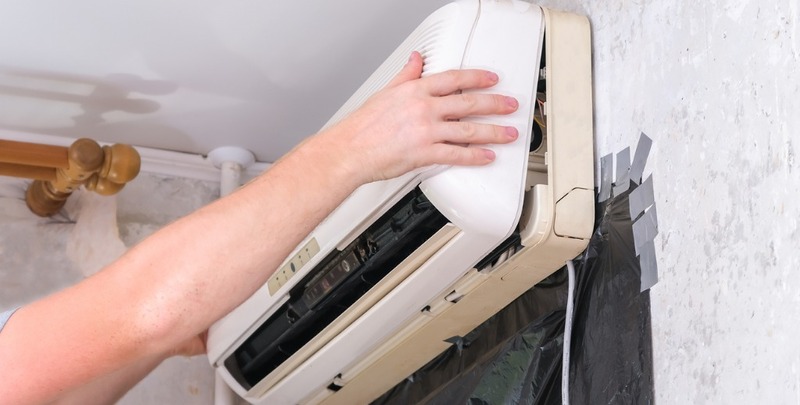Here in Australia, air conditioning is a way of life. Our beloved air cons allow us to live comfortably in one of the Earth’s hottest countries, and the gentle sound of a running AC has become the soothing background music to our summer months.
But this sound isn’t always so relaxing. If your air conditioner has started to become noisy or just louder than normal, it could indicate a system issue.
Of course, a little bit of noise from your air conditioner is normal. Air conditioning units are impressive machines that use several moving parts in order to work effectively. There’s bound to be some slight noise involved in their operational process. But there’s a fine line between their regular sound output and a more concerning noise level.
There are many reasons for a loud air conditioner. Regardless of the reason, an unusually noisy unit is not something to sleep on. An unexplained noise increase usually means that something has either gone wrong or is about to go wrong. The longer you wait to take action, the chances of severe damage only increase.
In this article, we’ll explore the most common air conditioner noises that raise a red flag, and what they likely mean.
Rattling Air Conditioning Unit
A rattling air conditioner noise is one of the most common sounds to raise suspicions. It’s also the air conditioner noise with the most potential causes. An AC making a rattling noise could mean that the fan inside the unit has come loose, or that the fan blades have become bent and are touching the unit walls.
The natural vibration that happens to air conditioners when they run may also be the culprit. Over time, this subtle vibration can pull panels or bolts on an air conditioner unit loose. These loose elements can then begin to rattle, causing the irritating noise. This vibration can also cause damage to an air con’s compressor motor by wearing down its rubber feet. This will unbalance the compressor, causing it to rattle.
If you notice a rattling coming from the area outside and around the unit, it could point to a foreign object inside the air ducts. This could include general debris from outside, or even small animals that are running around in the ducts.
Squeaking
If your noisy air conditioner is making a squeaking noise, it’s a good sign that your unit is overdue for a clean. The most common cause of a squeaking air conditioning noise is a build up of debris and dirt inside your unit. A squeaking air conditioner can also be the result of minor damage to the fan motor or fan blades.
If the motor is squeaking, it may just need a good cleaning or some lubrication. In any case, you should opt on the safe side and have your air conditioning unit professionally serviced.

Humming
Most air cons will naturally make a slight humming sound as part of their regular activity. However, excessive humming sounds may indicate a larger issue at hand. If the humming is noisy but still minor, it’s likely a dirty unit at fault. If your coil fins have become clogged by dust, dirt, or any foreign object, a loud humming noise may occur.
Loose parts and refrigerant piping can also cause vibration, resulting in a humming sound. This sound may also point to electrical issues with the unit. If the outdoor unit compressor is humming and refusing to start, you could have a motor issue at hand. Or the noise could also be triggered by loose wiring. In any case, it’s best to have your unit serviced by a professional technician to pinpoint and repair the problem.
Hissing
If you hear a persistent hissing noise from air conditioner units in your home, it might be cause for worry. While hissing noises could just mean a return air leak, which is not a big problem, they could also point to a refrigerant leak. Refrigerant chemicals are extremely toxic and dangerous if inhaled. If left unchecked, leaky refrigerant valves will only get worse and the hissing air conditioner noise will increase.
If you do suspect a refrigerant leak in your home, you must turn your noisy air conditioner off immediately. You should then contact your local HVAC technician to check the unit and perform any necessary repair service.
Clicking and Popping
Generally, occasional clicking and popping noises are quite standard from an air con system. However, it’s not normal for these sounds to persist throughout the day. This may mean your air con’s relay is malfunctioning and will need to be repaired or replaced.
A loud clicking noise might also mean a defective control system or a failing thermostat. Lastly, noisy air conditioners making a popping sound might be the fault of worn ductwork that pops when the air flow is turned off and on. Whatever the cause, if you find your ac making loud noise in this way, contact a professional for help.
Buzzing
If you find your ac making buzzing noise, there could be a multitude of possible issues at fault. These could include:
- Loose parts in the unit
- Dust and debris in both the indoor and outdoor unit
- Faulty or damaged fan blades
- Air filter or condenser coil needs to be cleaned
- Refrigerant leak in the system
Considering the large amount of possible culprits for buzzing air conditioners, the best course of action here is to check with a professional. They can repair any issues and make sure your system’s noises go back to their normal level.
Noisy Air Conditioner Solution
If you find your air conditioner making loud noise that you don’t understand, you shouldn’t wait around until something goes wrong. Call in an expert HVAC technician to give your unit a thorough service. They can identify the cause of your ac unit making loud noise, and can perform qualified repair service. Your air con will be running smooth and quiet again in no time.
Please note: This information is provided for advice purposes only. Regulations differ from state to state, so please consult your local authorities or an industry professional before proceeding with any work. See our Terms & Conditions here.

